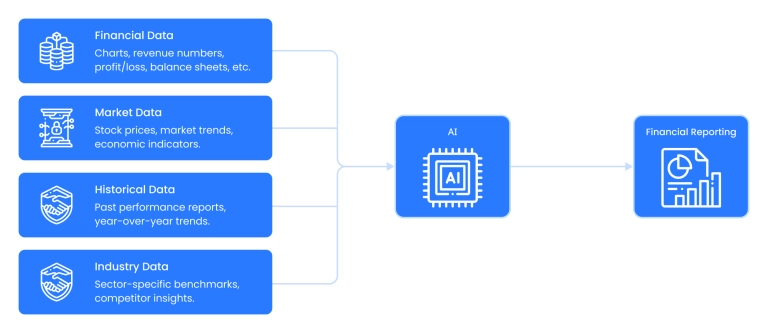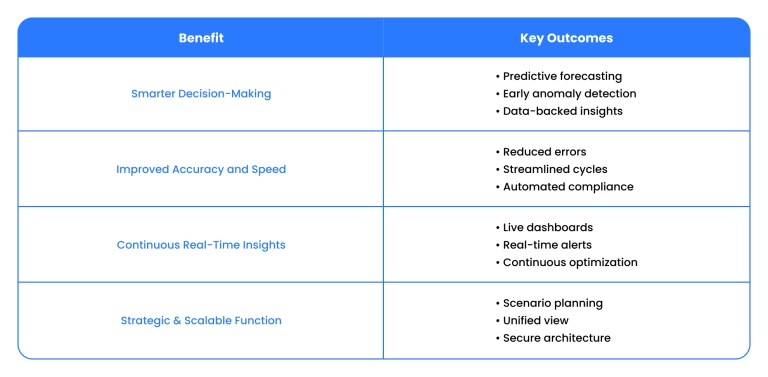Financial reporting is one of the most demanding and error-sensitive areas in business. It requires precision, regulatory compliance, and the ability to turn raw data into strategic insights, often under tight deadlines.
Yet according to Ventana Research, the average finance professional spends 40% of their workweek on manual data gathering and reconciliation — time that could be spent on analysis and strategy. That's where AI for financial reporting changes the equation.

By combining automation, analytics, and intelligent systems, organizations are replacing manual consolidation and static spreadsheets with real-time, data-driven reporting.
This evolution goes far beyond efficiency. AI enables finance teams to focus on analysis rather than data gathering, detect anomalies instantly, and generate predictive insights that guide business strategy. As seen in our article on Agentic AI in fintech , intelligent systems are already transforming financial operations through adaptive learning and autonomous workflows.
In this article, you'll learn:
- How AI-driven reporting differs from traditional financial processes
- Key benefits and use cases transforming finance functions
- The role of financial reporting AI bots in automation, auditing, and forecasting
- What to expect as AI and cloud technologies redefine the future of finance
Read on to see how enterprises are turning financial reporting from a compliance task into a competitive advantage.
What is AI in financial reporting?
AI financial reporting applies artificial intelligence, machine learning, and natural language technologies to automate financial workflows, analyze large datasets, and deliver real-time insights.
Instead of relying on static spreadsheets and manual reconciliations, AI-driven systems continuously learn from historical data, identify anomalies, and generate accurate reports faster and with fewer errors. This approach aligns with the broader adoption of AI across finance, the use of intelligent algorithms to enhance analysis, decision-making, and operational efficiency.
Unlike traditional reporting, AI in financial reporting is adaptive and predictive. It goes beyond summarizing past results, offering forward-looking insights that help financial leaders anticipate risks, forecast trends, and improve compliance.
Similar innovations are shaping fintech, as shown in AI in fintech , where intelligent automation already enables faster, data-driven decision-making across financial operations.
Key benefits of AI for financial reporting

AI is redefining how finance teams manage data, accuracy, and decision-making. By automating repetitive work and introducing predictive intelligence, it turns traditional reporting into a useful, insight-driven process.
1. Smarter decision-making
Integrating AI in financial analysis allows finance teams to interpret massive datasets faster and more precisely. Machine learning models detect trends, forecast market fluctuations, and reveal hidden cost drivers that manual methods often miss. This helps organizations move from retrospective reviews to proactive, data-informed planning.
Key outcomes:
- Predictive forecasting for revenue and expenses;
- Early anomaly and variance detection;
- Data-backed insights for executive decisions.
2. Improved accuracy and speed
The combination of AI and financial reporting drastically reduces human error and accelerates processes such as reconciliation, validation, and consolidation. Automated tools ensure consistent data quality across multiple systems and jurisdictions, enabling finance departments to close books faster and more accurately.
Key outcomes:
- Reduced manual workloads and reconciliation errors;
- Streamlined close cycles and audit readiness;
- Automated compliance documentation.
3. Continuous, real-time insights
By enabling financial reporting with AI, companies gain real-time visibility into performance metrics, compliance indicators, and operational risks. Interactive dashboards and automated alerts allow finance teams to respond immediately to deviations, transforming reporting into a living, continuous process rather than a monthly task.
Key outcomes:
- Live dashboards for instant KPI tracking;
- Real-time anomaly alerts and predictive analytics;
- Continuous performance optimization.
4. Strategic and scalable finance function
The use of artificial intelligence in financial reporting positions finance as a strong driver of growth, not just a compliance function. AI integrates seamlessly with ERP, CRM, and BI platforms, enabling advanced scenario modeling, ESG reporting, and risk management. As outlined in our fintech software development article, such systems also enhance scalability and security across enterprise environments.
Key outcomes:
- Data-driven scenario planning and forecasting;
- Unified view across financial and operational systems;
- Secure, scalable architecture for intelligent finance.
AI transforms financial reporting into an engine of foresight and efficiency, empowering finance leaders to make faster, more confident, and strategically aligned decisions.
Financial reporting technology and digital transformation
The convergence of AI, machine learning, and cloud technologies is fundamentally changing how finance teams operate. Traditional reporting once relied on static spreadsheets and siloed systems, but modern financial reporting automation enables continuous data flow, instant validation, and predictive accuracy.
Instead of reconciling numbers at month-end, CFOs now access real-time financial intelligence that evolves with every transaction.
Key elements:
- AI and ML integration: Automates repetitive accounting tasks, detects anomalies, and forecasts financial outcomes with high precision.
- Cloud infrastructure: Provides scalability, security, and instant data accessibility across teams and geographies.
- Advanced analytics tools: Turn complex financial data into actionable insights through visualization and predictive modeling.
- Cross-system connectivity: Links ERP, CRM, and BI tools into one unified reporting ecosystem.
Cloud-based ecosystems enable enterprises to scale globally and integrate intelligence directly into their finance workflows. The rise of these capabilities mirrors ongoing fintech trends where automation and analytics are redefining decision-making speed and accuracy.
At Binariks, we support organizations in implementing AI for financial statement analysis, developing platforms that use AI, ML, and secure cloud infrastructure to enhance accuracy, transparency, and foresight in every reporting cycle.
Partner with Binariks to build intelligent financial systems that scale with your enterprise needs.
The future of financial reporting
The next evolution of finance is being defined by intelligence, autonomy, and seamless integration. As automated financial reporting becomes the standard, the focus is shifting from producing reports to enabling continuous, insight-driven decision-making.
Emerging technologies, such as Generative AI, Agentic AI, and autonomous bots, are pushing the limits of what finance teams can achieve — from fully automated close cycles to predictive planning and narrative report generation.
Future-ready finance departments will operate as self-learning ecosystems. Intelligent systems will interpret unstructured data, draft commentary for financial statements, and simulate multiple "what-if" business scenarios in real time. These capabilities will allow CFOs to focus entirely on strategy, not data processing.
Key technologies shaping this transformation:
- Agentic AI: Self-directed AI agents capable of managing full reporting workflows, from data gathering to analysis and interpretation.
- Generative AI: Creates automated insights, narratives, and management summaries from raw financial data.
- AI bots: Handle audit tasks, document classification, and regulatory submissions autonomously.
- Predictive analytics in fintech: Powers dynamic forecasting, risk modeling, and scenario planning with real-time accuracy.
- Cognitive cloud platforms: Combine AI, ML, and cloud scalability to deliver an adaptive, enterprise-wide tool that evolves with business needs.
Over the next decade, financial reporting technology will evolve from being a tool to becoming an integral part of business strategy. At Binariks, we envision a future where AI-powered systems not only report on the past but also inform the financial decisions of tomorrow.
Challenges and considerations
While AI brings efficiency and intelligence to finance, adopting it in reporting isn't without challenges. Businesses must strike a balance between innovation and governance, ensuring data integrity, compliance, and accountability as automation scales. These considerations determine whether AI becomes an asset or a liability in the financial ecosystem.
Key challenges to address:
- Data quality and consistency: AI models are only as reliable as the data they process. Poor data hygiene can lead to inaccurate forecasts and flawed insights.
- Regulatory compliance: Automated systems must align with accounting standards and evolving audit regulations to avoid governance risks.
- System integration: Connecting legacy software with modern reporting platforms remains a technical and operational hurdle for many enterprises.
- Model transparency: Finance leaders need explainable AI to justify outcomes and maintain trust with auditors and stakeholders.
- Security and privacy: As financial data becomes increasingly cloud-based, ensuring protection against breaches and unauthorized access is critical.
Working with experienced fintech software development companies can help organizations overcome these barriers by implementing secure, transparent, and compliant AI solutions that meet regulatory requirements. Done right, AI transforms financial reporting from a risk to a competitive advantage.
Cutting manual work, reducing errors, and accelerating compliance workflows
Case Study: Transforming Fund Administration with AI
Case study: How a global asset manager achieved a 90% reduction in processing time
When one of the large asset management firms, overseeing $44 trillion in assets under custody and $2.4 trillion in assets under management, faced a bottleneck in fund administration, it turned to Binariks for help.
Their reporting department was overwhelmed by manual validation, processing 15,000 reports per year, each containing 300–400 questions that were checked against complex Excel sheets. This process drained analyst resources, increased compliance risks, and made scalability nearly impossible. Leadership realized that sustainable growth required a complete shift toward intelligent automation.
To address the challenge, we deployed a specialized eight-person team of AI engineers, data scientists, and financial reporting experts. The goal was clear: replace manual validation with an AI-powered system capable of autonomous data extraction, intelligent review, and dynamic scalability.
Core implementation steps:
- Intelligent document processing: Using Azure Text Analytics and Form Recognizer to extract and structure data from complex PDF financial reports.
- AI-driven validation engine: Fine-tuned LLM models trained on financial data to answer validation questions contextually and detect anomalies.
- Workflow orchestration: Azure Logic Apps automated data flow, while Azure Data Lake ensured secure storage and analytics scalability.
- Visualization and monitoring: Interactive Power BI dashboards provided real-time validation results and compliance tracking.
- DevOps automation: Terraform and GitHub Actions supported continuous deployment and system reliability across environments.
Measurable impact
Within six months, Binariks delivered a production-ready AI validation platform that transformed the client's fund administration capabilities:
- 90% reduction in processing time — what took days now completes in hours.
- 75% error elimination, with AI even uncovering discrepancies in historical reports.
- Cost efficiency: Annual system cost equals just 1.5 analyst salaries while processing over 15,000 reports per year.
- Strategic value: Freed analysts can now focus on financial insights, rather than repetitive checks, enabling faster decision-making and new growth initiatives.
This collaboration proved how AI can redefine large-scale fund administration. By automating validation, improving accuracy, and reducing costs, Binariks helped the client turn operational limitations into a great advantage, setting a new benchmark for intelligent financial reporting at enterprise scale.
Conclusion
AI has transformed financial reporting from a manual, compliance-driven function into a source of real-time insight. Companies that adopt intelligent automation gain faster closing cycles, higher accuracy, and deeper visibility into financial performance — all while freeing their teams to focus on value creation rather than repetitive tasks. The shift toward predictive, adaptive reporting is no longer optional; it's a competitive necessity.
At Binariks, we design and implement AI-powered reporting solutions that help global enterprises achieve measurable efficiency and long-term scalability. If your organization is ready to modernize its financial systems, contact us and let's turn your reporting into a true strategic advantage.
Share

